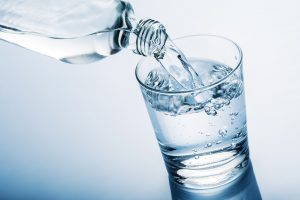Do you get your eight cups of water a day? I’m sure you have heard this question from your health care provider, nutritionist, and even in health articles online. Water is vital to life, but you may not know exactly why. There are many benefits to water such as:
- regulating the temperature in your body
- lubricating joints
- protecting the tissues in your body
- flushing out toxins and waste from your body
Your recommended daily intake of water depends on various factors such as weight, activity level, health status, and the climate in which you live. On average, the recommended daily fluid intake is half of your body weight in ounces. For example, if you  weigh 150 pounds, then you are suggested to drink 75 ounces, or about 9 and a half cups of fluid a day. Tea, coffee, juice, fluid from fruits and veggies, as well as broths also count towards fluid intake. However, caffeinated drinks such as coffee and cola also act as diuretics since caffeine is a stimulant; therefore these types of fluids can actually dehydrate you if consumed in excess.
weigh 150 pounds, then you are suggested to drink 75 ounces, or about 9 and a half cups of fluid a day. Tea, coffee, juice, fluid from fruits and veggies, as well as broths also count towards fluid intake. However, caffeinated drinks such as coffee and cola also act as diuretics since caffeine is a stimulant; therefore these types of fluids can actually dehydrate you if consumed in excess.
Those who live in hot climates, have a fever, or have lost fluids due to diarrhea, vomiting, or other illnesses may require above the daily suggested fluid intake. However, those who have kidney disease or conditions like lymphedema may be told by their healthcare provider to restrict their fluid intake.
Water Intake and Weight Loss
When you are trying to lose weight, you may have been told to drink more water to feel fuller so you will eat less. Also, you may have heard that drinking more water will help reduce bloating. Although these two suggestions may be effective, research shows that there are other reasons water intake may benefit weight loss.
In the journal Nutrients, researchers observed 16,000 subjects from Spain over 8.5 years. Over the course of the study, 900 of these subjects became obese. Those who switched a glass of beer for a glass of water each day reduced their risk for obesity by 20-percent. Furthermore, doing the same for sugar-sweetened beverages reduced the risk of becoming obese by 15-percent. Replacing other beverages with water such as whole milk, reduced-fat milk, skim milk, wine, spirits, diet sodas, coffee, orange juice, and other juices did not reduce obesity risk. The study cannot confirm a direct cause and effect link of water intake and reduced risk of obesity.
However, regardless of the study results, it is always good to reduce drinking your calories. When you reduce consumption of calorie-laden beverages, you will reduce daily sugar intake, in turn leaving more daily calories to use for consuming foods that will provide more nutritional benefit. By reducing daily sugar intake, you will be able to also better control blood glucose levels in your body.
Other ways you can control blood glucose levels is through:
- eating healthy carbohydrates such as fruits, vegetables, and whole grains throughout the day
- limiting consumption of processed food products that are high in sugar and fat
- reducing intake of sugar-sweetened foods such as candy, baked goods, and ice cream
- taking supplements such as Glucarex by Vita Sciences. Glucarex contains vanadium and bitter melon which have both been shown to support healthy blood glucose levels.
-written by Staci Gulbin, MS, MEd, RD, LDN
Sources:
Centers for Disease Control (accessed May 20, 2017) “Water & Nutrition” https://www.cdc.gov/healthywater/drinking/nutrition/
Preidt, R. (May 18, 2017) “Drink Water, Fight Fat?” https://medlineplus.gov/news/fullstory_165714.html